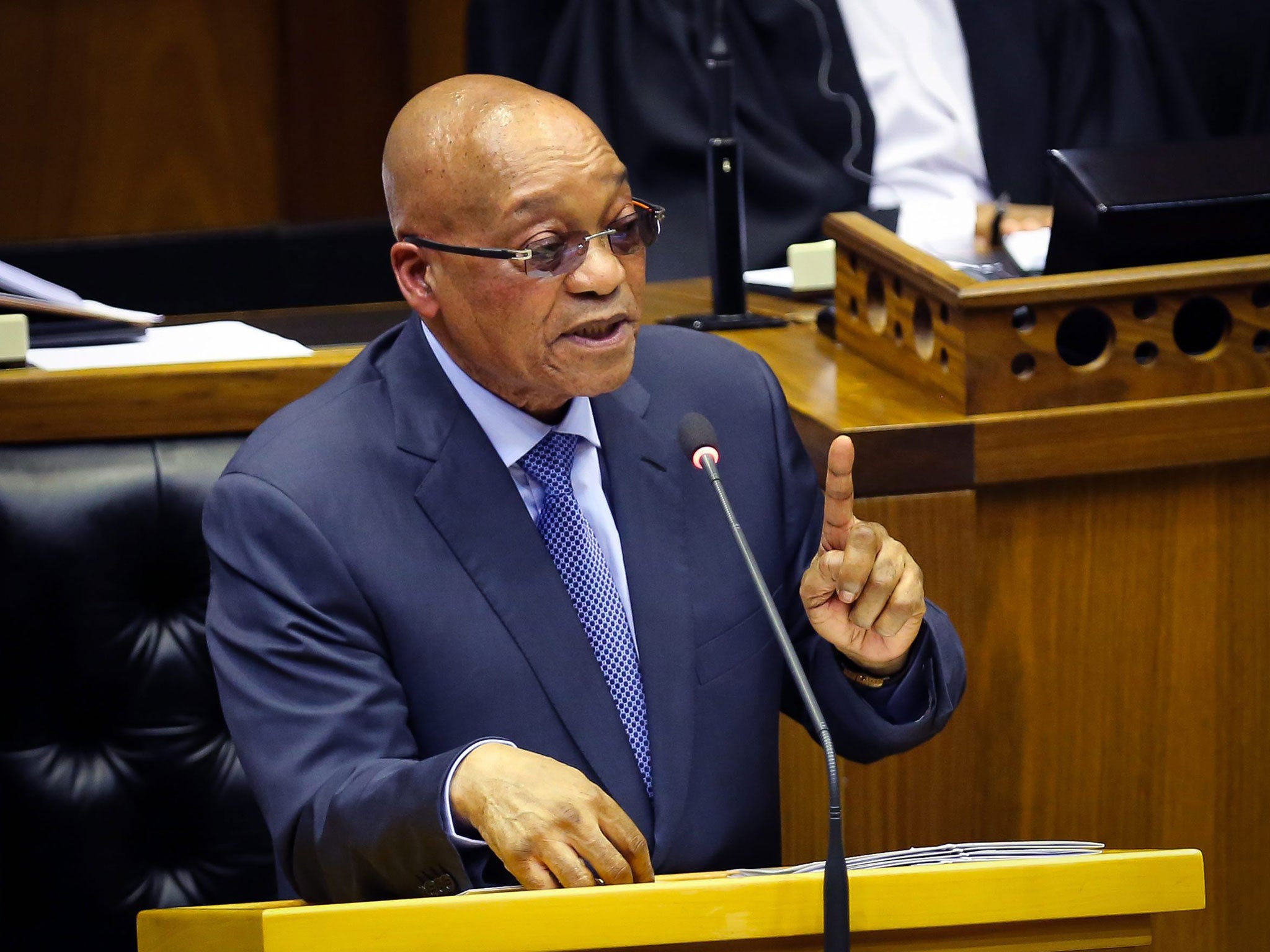Jacob Zuma needs to end his inglorious and embarrassing reign in South Africa
Mr Zuma has made the task of recovery as urgent as it is difficult

Your support helps us to tell the story
From reproductive rights to climate change to Big Tech, The Independent is on the ground when the story is developing. Whether it's investigating the financials of Elon Musk's pro-Trump PAC or producing our latest documentary, 'The A Word', which shines a light on the American women fighting for reproductive rights, we know how important it is to parse out the facts from the messaging.
At such a critical moment in US history, we need reporters on the ground. Your donation allows us to keep sending journalists to speak to both sides of the story.
The Independent is trusted by Americans across the entire political spectrum. And unlike many other quality news outlets, we choose not to lock Americans out of our reporting and analysis with paywalls. We believe quality journalism should be available to everyone, paid for by those who can afford it.
Your support makes all the difference.Embroiled in the worst of the multiple scandals of his presidency, it is time for South Africa’s President Jacob Zuma to quit. But only a congenital optimist would imagine that merely removing this fascinating but dangerous figure from the political scene will cure the numerous problems that will be his sorry legacy.
The latest crisis exploded when the Deputy Finance Minister, Mcebisi Jonas, claimed that the Guptas, three Indian-born brothers whose South African business empire has boomed under Mr Zuma’s benign watch, offered Mr Jonas the job of finance minister – and, when he threatened to make the offer public, a “prominent businessman” sent him a menacing text, in effect a death threat, which read: “Please keep your own counsel. Martyrdom is best left to Christ.”
Both Mr Zuma and the Guptas have denied Mr Jonas’s story. But it feeds into the long, troubling narrative of Mr Zuma’s rule which has overseen the intertwining of private and public interests, the abuse of public funds, high-level public appointments based on patronage and pliability, and the frequent use of veiled threats of blackmail to obtain political goals.
Mr Zuma’s political persona is that of a flamboyant, even clownish populist, whose cheerful excesses – the swimming pool and amphitheatre he added to his home at a cost to the public purse of £12.9m, the charge of rape of which he was cleared, the three wives and the child born out of wedlock, the song “Mshini Wami” or “Bring me my machine gun”, which he likes to revive on stage – only tightened his bond with the black masses who have kept the ANC in power since the end of apartheid.
But the real clue to his grip on power is the fact that, during the struggle against apartheid, he was the head of the party’s internal spy agency, Mbokhodo, and mastered the dark arts of surveillance and intelligence, which enabled the party to survive. He has brought those skills and strategies to bear on the task of remaining in power, to such good effect that both he and his party seemed for many years to be immune to challenges from the opposition, blessed with near impunity.
But this method of retaining control has proved disastrously corrosive to the party, with the result that today it is riven with factionalism, fear and loathing, as well as institutionalised corruption. If Mr Jonas is to be believed, this has extended to the point of allowing the Guptas, who are in business with Mr Zuma’s son Duduzane, to mount a takeover bid on the ministry of finance, with the goal, one would infer, of making state policy subservient to their personal business interests. No wonder the rand plummeted when the allegations first emerged. Something very similar happened back in December, when Mr Zuma replaced his respected Finance Minister with an MP with no financial experience. After investors expressed grave concern and the rand tumbled, the President was forced to backtrack a few days later and appoint a more suitable candidate.
If, as many wish, Mr Zuma is forced out by the present crisis, he will leave South Africa in a far more frail and perilous state than when he was elected. If the ANC is ever to fulfil its historic remit and lead a revolution – now long overdue – in the living and educational standards of the mass of the population, a robust state in which the rule of law functions and the constitution is respected is a basic requirement. Mr Zuma has made the task of recovery as urgent as it is difficult.
Join our commenting forum
Join thought-provoking conversations, follow other Independent readers and see their replies
Comments